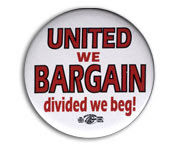KING COUNTY, WASHINGTON
Finally, success has arrived for library workers here. After two failed attempts to organize in the last seven years, they pooled their activist energies and broke through with a major win in last December's election. The final tally for the group of 550: an impressive 298 to 157. They are now members of Council 2.
In previous efforts, organizers struggled to come up with a respectable number of signatures to file a petition to trigger a vote. One reason: the county's library system — the largest in the state (it serves Seattle) — has 42 branches, and the workers couldn't put together an aggressive team of people to form an organizing committee.
The workers are not unhappy with their wages or benefits. "But I was very disappointed that we weren't getting the message across or understanding of what we were trying to do," says Susan Veltfort, a librarian who was heavily involved in talks with her co-workers.
In addition, management showered them with promises of improvements, which were never made. But, Veltfort says, workers caught on rather quickly when they watched their bosses make unpopular changes while leaving them out of the decision-making process. For example, jobs were often reclassified or employees transferred to different locations without their consent.
DRIVING THE BUS. Applying many of the principles in the AFSCME organizing model, union advocates formed a committee and designated a representative for each branch. For Veltfort, who works at the library Service Center, getting involved was natural. She's a born activist: "If the bus is going down the road, I have to be the one driving it."
The team enlisted the support of volunteer member organizers — library workers from Seattle and nearby counties — who are already AFSCME members and are covered by collective bargaining agreements. They conducted home and worksite visits which were a key to their success. They hosted informative brown-bag luncheons at the sites. They also did phone banking and created a Web site that provides organizing updates as well as contact information for the committee.
At the outset of the campaign, the county's library director accepted a neutrality agreement, which Council 2 officials say empowered the committee "right up front." After negotiation, an accord was reached that satisfied both parties.
In addition to talking to workers one by one, the workers tried something very different: They rented a van — to look like the popular library bookmobile — and dubbed it the Library Organizing Van. The vehicle circulated among the sites where activists set up green tables decorated with green and white balloons, and it served as a draw.
"It's easy for people to ignore attempts to communicate with them," notes Laura Ritter, a library assistant/technical assistant from the Duvall branch. "Something like the union mobile is hard to ignore, even if you're against the union idea. We certainly had a lot of discussion, which made us aware of more concerns."
Dozens of curious and loyal library customers also came out to inquire about what was going on. Word soon spread throughout the county that library workers were fighting for union representation and fairness at work.
OUTLASTING THE BOSS. Although managers had agreed to neutrality, it was apparent that they wouldn't stay neutral for long, especially since the organizing campaign had snowballed. Experienced committee members were ready for a sneak attack toward the end of the campaign.
Management started circulating The Weekly Memo at the worksites, loading it with disparaging questions and answers about what could happen if the employees joined AFSCME. Each time one was released, the organizers countered with The Weekly Memo Revisited, a factual, light-hearted publication that set the record straight.
"We didn't want this to turn into a mud-slinging battle," says Ritter, "or adversely impact any of the people who were sitting on the fence. We just wanted to make sure that factual information came out."
The organizing campaign was a huge accomplishment: 87 percent of the eligible voters turned out on election day. But the number didn't surprise Ritter. "We worked long and hard, and talked to just about anybody that we could," she points out. "The employees really care about the libraries; they want to be here. And many of them had become upset with what was happening to their library system."
ROUND TWO. In January, organizing committee members met to discuss their strategy for first-contract negotiations. The committee's success, Veltfort says, has prompted workers who didn't participate in organizing activities to step forward. "They now say, 'Wow. We can really do something about this!'"
One thing is for certain: Organizing has solidified the camaraderie among a band of workers who already share a passion for opening the world up to people through books, magazines and other communication media. If they follow the first-contract model, and succeed there, too, the final chapter will show that union members can achieve anything when there is solidarity.
Tuesday, April 01, 2003
Subscribe to:
Post Comments (Atom)




1 comment:
This coming week (12/4/2006), KCLS Librarians and Paraprofessionals who supervise (and were not eligible for inclusion in Local 1857) will vote to form their own bargaining unit. We only began our efforts in the dog days of summer, a compressed time frame that could not have been possible without the groundwork began by Local 1857. We owe them a large debt of gratitude. Thanks also to Council 2.
Post a Comment